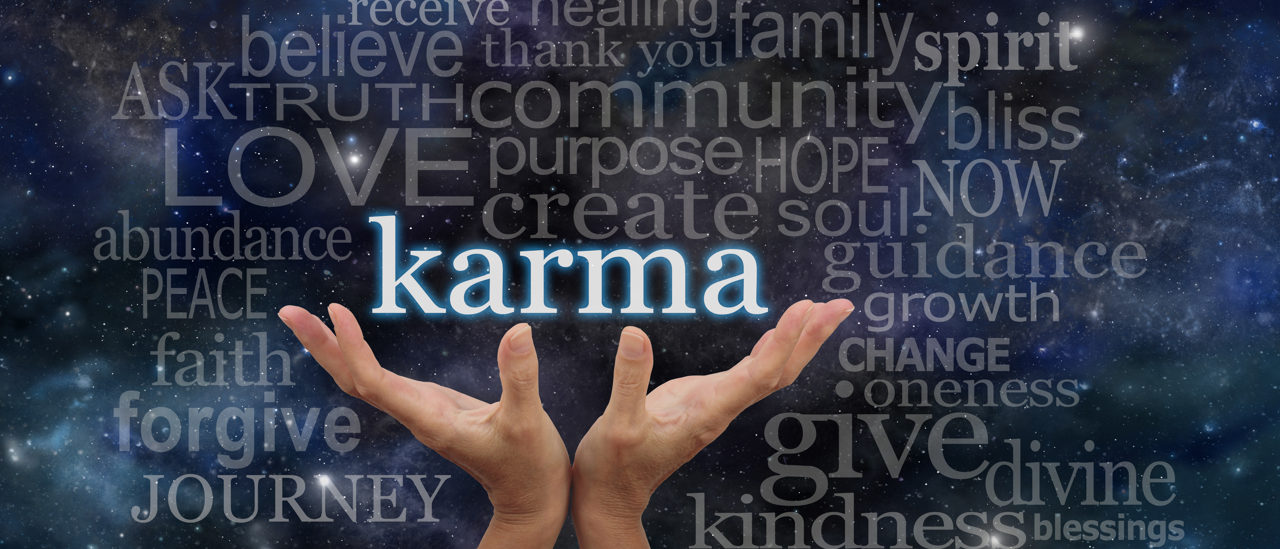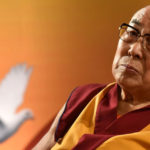Insights on Two Fundamental Hindu Concepts From the Teachings of Sivaya Subramuniyaswami
OUR WISE RISHIS OF LONG AGO desired to know the mysteries of life and death. What happens after death? Why is there so much happiness for some and suffering for others in a lifetime? The Gods revealed to the rishis in their deepest meditations the answers to these puzzling questions. They revealed the laws of karma and reincarnation which are now two of Hinduism’s most central beliefs. They capsulize our ancient religion’s view of life, death and immortality. All Hindus know that they take many births and receive the results of their own actions in this and future lives.
Karma is the law of action and reaction which governs life. The soul carries with it the mental impressions it received during its earthly life. These characteristics are collectively called the karma of the soul. Karma literally means “deed or act”, and more broadly describes the principle of cause and effect. Karma is not fate, for God endowed his children with the power to act with free will. Esoterically, karma refers to the totality of our actions and their concomitant reactions in this and all previous lives, all of which determine our future.
Try striking the top of a table with your bare knuckles? It would hurt, wouldn’t it? The harder you strike, the more the pain. Action is followed by reaction. And, the reaction is equal to the action. In a similar way, if you cause pain to someone else, you can be certain that the same pain will come back to you. It may not return immediately, maybe not even during this lifetime. But it will return in your next life, or even in some life after that. When the reaction to your previous action of causing pain to another being does return to you, you will feel the same pain. If the pain inflicted was mental, mental pain will return. If the pain inflicted was emotional, emotional pain will return. If the pain inflicted was physical, physical pain will return. Be it mental, emotional or physical. That is why even good people suffer. They may be paying for some action that was done in a past life. If you do good, too, the good will be returned to you somehow.
Yes! Karma is the law of action and reaction which governs life. The soul reaps the effects of its own actions. If we cause others to suffer, then the experience of suffering will come to us. If we love and give, we will be loved and given to. Thus does each soul create its own destiny through thought, feeling and action. Karma is a natural law of the mind, just as gravity is a law of matter.
Karma is movement in the mind. When the mind remains motionless, there is no karma. Every action has a reaction. If you plant eggplant, you can pluck eggplant. If you sow goodness, you can reap goodness. If you sow evil, you will reap evil. You can only reap the fruit, bitter or sweet, of your own actions. Since each action has a corresponding reaction, the effects of karma-action and reaction-can be helpfully invigorating or fearfully devastating. Therefore the wise govern their lives anticipating the results of their actions, for they know that in causing an action they necessarily cause a reaction. They want to know what the reaction will be before causing the action. They know that not all reactions are immediate; that they are cumulative and in some cases rebound unexpectedly. The wise understand penance as a self-inflicted karma or prepayment of a reaction expected because of a previous action caused. Penance well performed intercedes between the action and the reaction, counterbalancing both and smoothing out the karma.
WHAT IS REINCARNATION?
Life does not end at the death of the physical body. The body dies but the soul does not. It lives on in a counterpart of the physical body which is called the astral body. The astral body is made of astral matter and resides in a world not unlike this one, called the Devaloka or Second world. In other words, in order to perfect itself, to spiritually unfold and evolve, the soul lives on in another body after death, the astral body. At the right time, according to its karma, it is reborn into a flesh body. Thus the astral body, with the soul within it, enters a new physical body. This same cycle is repeated many times until the soul spiritually unfolds and reaches a certain state of perfection or mature evolution. These repeated cycles of births and deaths are known as samsara. The soul passes from one physical body to another. Each time it does so, the Hindu says, the soul has reincarnated. This is the process to which the name “reincarnation” is given.
Therefore, the Hindu does not believe in a single life on earth, followed by eternal joy or pain. Hindus know that all souls reincarnate, take one body and then another, evolving through experience over long periods of time. To a Hindu death is not fearsome. Like the caterpillar’s metamorphosis into the delicate butterfly, death does not end our existence but frees us to pursue an even greater development. The soul never dies. It is immortal. Physical death is a most natural transition for the soul, which survives and, guided by karma, continues its long pilgrimage until it is one with its creator, God. Reincarnation is the natural cycle of birth, death & rebirth, called samsara. When we die, the soul leaves the first world physical body, it lives for a while in the Devaloka, the Second World, before returning again to earth, the Bhuloka or First World.
THE MANY FACETS OF REINCARNATION
Reincarnation is many-faceted. Through the ages it has been the great consoling belief within our religion, eliminating the inborn fear of death. Hindus do not fear death, nor do they look forward to it. Each one knows being is eternal. In stepping out of the physical body, consciousness continues in unbroken continuity in the astral body, its exact duplicate. In the Devaloka, mind continues, emotions continue, associations continue. There is no escape from life’s experiences. We must re-experience the karma that we have created, be it joyous, painful or mixed. Suicide, for instance, only accelerates the intensity of one’s karma, bringing a series of immediate lesser births and requiring several lives for the soul to return to the exact evolutionary point that existed at the moment of suicide, at which time the still-existing karmic entanglements must again be faced and resolved. Thus turns the slow wheel of samsara.
MOKSHA: FREEDOM FROM REBIRTH
The next question the rishis asked the Gods: What must a person do if he wishes to reach the blissful state of union with God? Is there a state that not only confers upon us supreme, unbroken bliss, but also puts an end to pain, sorrow and suffering? Does this process of reincarnation go on forever? The Gods explained: No. Each time the soul takes on a new body, it get closer and closer to becoming perfect. To gain a better birth each time, one must live according to the natural laws that Hinduism proclaims and live out the karma in this life positively and fully while at the same time refraining from creating painful new karmas. After a number of such excellent incarnations, and after God-realization has been attained, the soul body becomes mature enough that it no longer needs to take a physical incarnation. Instead, it continues its evolution on inner planes of consciousness. This release from samsara is called Moksha. The soul is said to be freed from the bondage of birth and death.
So, we can see that the goal of a Hindu’s life is to halt the process of births and death. Life’s ultimate goal is not money, not clothes, not sex, not power, not food or any other of the instinctive needs. These are natural pursuits, to be sure, but our real purpose on this earth is to know, to love and to serve God and the Gods. This will eventually lead us to the rare and priceless object of life which is now called by many names” enlightenment, liberation, Self-Realization, God-Realization, nirvikalpa samadhi and finally Moksha. After many lifetimes of wisely controlling the creation of karma and resolving past karmas when they return, the soul is fully matured in this love and trust in God and the Gods and their goodness, and in the knowledge of these divine laws and the wise use of them. Therefore there is no longer a need for physical birth, for all lessons have been learned and all karmas fulfilled. That individual soul is then naturally liberated, freed from the cycle of birth, death & rebirth on this planet. After Moksha, it was revealed to our rishis, our soul continues its evolution in the inner worlds, eventually to merge into God as a drop of water merges with its source, the ocean.
MOKSHA IN SUMMARY
Moksha comes when all extraneous karmas have been resolved and God has been fully realized. This means that before Moksha, the soul must have gone through all the experiences of life in the physical world. Once having faced in the spirit of love and understanding all of these various and varies experiences, Moksha comes and marks the way-station where the liberated soul is free from rebirth. When our soul has sufficiently evolved and undergone all necessary karmas in this physical universe and God-Realization has been attained, it will not return to the First World. All the worlds rejoice when an old soul is freed from samsara, the cycle of birth, death and rebirth. Moksha is sought for and is expected to be attained by every Hindu. But every Hindu does not expect that it will necessarily come in this present life, even though it is sought for as the ultimate goal. Hindus know this and do not delude themselves that this life is the last. Seeking and attaining profound spiritual realizations, they nevertheless know that there is much to be accomplished on the earth and that only a rare few attain Moksha. One can know past and future births. By getting rid of desire, one can put an end to birth altogether; this great truth all Hindus know. “In all my births with me God stayed. My present birth God will terminate. To make me free of future births God gave His grace to me.”
WHAT SHOULD WE DO?
Hindus know that because of the law of karma we will have to be born again and again to reap the fruits of all actions, good, bad and mixed. How then do we stop the process? Understanding the way karma works, the Hindu naturally seeks to live a good and virtuous life through right thought, right speech and right action. When one thinks, speaks and act correctly, one feels good about oneself, for we are then living in harmony with the whole of creation, expressing the higher qualities of our own divine soul. We perform an action without expecting or wanting anything in return. When all actions are mentally surrendered to God, one will not be affected by their reaction. By maintaining this attitude, Hindus attain purity of heart and mind.
A devout Hindu will always affirm: “I am not doing anything. God is acting through me. It is all His Will.” In this way, actions and their reactions, good, bad or mixed, dissolve, and mental freedom and inner peace is maintained; and the mind occasionally merges in the ocean of God. Thus one of the goals of life is experienced, and painful karmas are not created to be re-experienced at a later time.
You cannot get rid of mental pain simply by exposing it. But if you try to be good, loving and honest, mental pain will disappear. Invoke the grace of God and restrain the mind from wandering along the path of the senses. Repeat mantras so when your past karmas come they will not overpower you. Events take place in life according to parabdha karma – the karmas brought with us into this life. But, these really do not affect the soul unless by mere habit or ignorance one identifies oneself with these events, then one becomes subject to pain and pleasure.
The Hindu religion is the law of God, and it has built within it the actions and interactions to dissolve painful karmas and refine joyous karmas. The Hindu religion advises all of its members to perform some kind of sadhana regularly; to make a pilgrimage once a year to a holy place; to see to the needs of relatives, guests, holy persons and the poor; to invoke the divine energies and direct the mind toward useful thoughts, thus circumventing the creation of new burdensome and painful karmas. In following some or all of these religious observances, the Hindu finds emancipation from the heavy bondage of unseemly karmas.
KNOWLEDGE FOR MAN TODAY
There are many men and women in the world today who naturally understand and appreciate the laws of karma and reincarnation. They recognize that the Hindu view of the soul’s evolution answers many otherwise bewildering questions, removing the fear of death while giving assurance that each soul is evolving toward the same spiritual destiny.
Yes, Hindus believe in reincarnation. They believe that they are not their physical body but live within it as a divine and perfect immortal soul. Hindus believe that the process of God-realization and the end of birth does not begin and end in a single life, but that this process is continuous, reaching beyond the limits that one life may impose. Of course, the law of karma assures one of a better birth if life has been lives virtuously. The Hindu also knows that if one does not live an ethical life, suffering will come in a future life.
The belief in karma and reincarnation brings to each Hindu inner peace and self-assurance. The Hindu knows that the maturing of the soul takes many lives, and that if the soul is immature in the present birth, then there is hope, for there will be many opportunities for learning and growing in future lives. Yes, these beliefs and the attitudes they produce eliminate anxiety, giving the serene perception that everything is all right as it is. There is no sense of a time limit, of impending judgment of actions and attitudes, in a Hindu’s mind. And, there is also a remarkable insight into the human condition and appreciation for all men in all stages of spiritual unfoldment.
Hinduism affirms that is possible for every person on earth to reach Moksha – to be free from rebirth. The great beauty of Hinduism lies in professing hope and promise for all, regardless of their differences. There is no terrifying state such as “eternal damnation” in Hindu doctrine. No one is damned. We have the glorious example of Rishi Valmiki, who was once a plunderer and murderer of the vilest type. He changed his ways for the good. Through the power of God he became a sage and gave to the world the immortal Ramayana, one of the great epic poems of Hinduism.
Hinduism is so broad. Within it there is a place for the insane. There is a place for the saint. There is a place for the beggar and for those who support beggars. There is a place for the intelligent person and plenty of room for the fool. The beauty of Hinduism is that it does not demand of every soul perfection in this life, a necessary conclusion for those who believe in a single lifetime during which human perfection or grace must be achieved or all is lost. Belief in reincarnation gives the Hindu an acceptance of every level of humanity. Belief in karma gives the Hindu caution, foresight and wisdom in handling the affairs of life.
There are one billion Hindus in the world today. Hinduism attends to the needs of each one. It is the only religion in the world today that has such breadth, such depth. Hinduism contains the Deities and the sanctified temples, the esoteric knowledge of inner states of consciousness, yoga and the disciplines of meditation. It possesses a gentle compassion and a genuine tolerance and appreciation for all religions. It believes in a just world in which every soul is guided by karma to the ultimate goal of Moksha. It rests content in the knowledge of the Divine origin of the soul, its passage through one life and another until maturity has been reached. It offers guidance to all who take refuge in it, from the non-believer to the most evolved rishi. It cherishes the largest storehouse of scripture and philosophy on the earth, and the oldest. It is endowed with a tradition of saints and sages, of realized men and women, unrivaled on the earth. It is the sum of these, and more which makes us boldly declare that Hinduism is the greatest religion in all the world.








